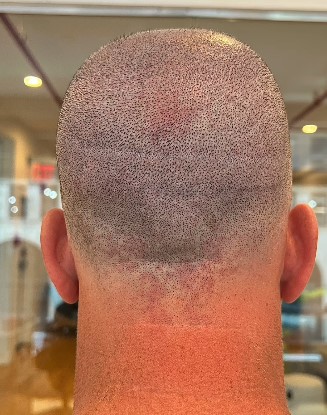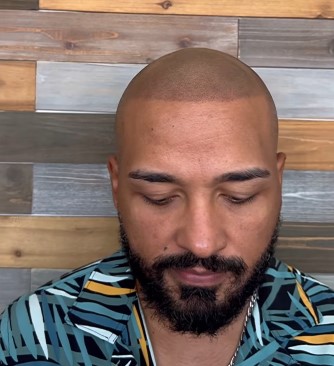
Cortisol, an endogenous hormone secreted during moments of stress, exerts influence over the dynamics and periodicity of hair follicles. Divergent from popular conceptions, tetrahydrocannabinol (THC) has the potential to augment cortisol concentrations within the organism. This augmentation may trigger telogen effluvium, an acute manifestation of hair loss typified by premature entry of hair follicles into the telogen phase.
Is Cannabis a Catalyst for Hair Loss?
With a legacy spanning centuries, marijuana, also referred to as cannabis or colloquially as “weed,” has sustained dual roles as both a recreational and medicinal entity. Recent scholarly inquiry has illuminated potential detriments of cannabis consumption, possibly impacting hair well-being. This discourse delves into the interplay between cannabis usage and hair loss, unraveling conceivable etiologies, and offering insights into potential strategies for mitigating or precluding hair shedding.
Exploring the Cannabis-Hair Loss Nexus
Absent rigorous empirical corroboration, an unequivocal nexus between marijuana and hair loss remains elusive. Nonetheless, the utilization of marijuana—be it through smoking, vaping, or ingestion—can potentially instigate hair loss due to heightened levels of stress and anxiety. Further exacerbating this linkage, cannabis employment may precipitate nutritional deficiencies that aggravate hair loss.

via @scalpmicro_usa
Cannabis’s Influence on Nutritional Equilibrium
The pivotal mechanism potentially underpinning cannabis-related hair loss resides in its perturbations of nutritional equilibrium. Engagement with cannabis has been correlated with suboptimal dietary choices, characterized by amplified cravings for unhealthy sustenance and consequent weight gain. This dietary shift can precipitate nutritional insufficiencies that reverberate detrimentally upon hair health.
Cannabis’s Perturbation of the Hair Growth Cycle
Evidence also underscores cannabis’s propensity to disrupt the natural trajectory of the hair growth cycle. The psychoactive component of cannabis, THC, forms bonds with receptors embedded within the endocannabinoid system—a regulator of hair growth. This interaction can precipitate aberrations in the customary hair growth cycle, culminating in hair thinning and loss.
Cannabis’s Potential Impact on Hair Shaft Integrity
Additionally, cannabis’s potential deleterious impact upon hair shaft integrity emerges as a plausible contributor to hair loss. Empirical inquiry has underscored THC’s potential to engender hair shaft damage, rendering them predisposed to fragility and split ends. Such structural impairment translates into thinning and loss of hair volume.
Succinctly stated, while the association between cannabis usage and hair loss is subject to debate, certain circumstances could implicate cannabis as a contributor to hair loss.

via @scalpmicro_usa
Guidelines for Chronic Cannabis Consumers
Adherents of consistent cannabis consumption should heed the ensuing recommendations to circumvent conspicuous hair loss.
- Cultivate Nutritional Adherence A deliberate focus on sustaining a healthful dietary regimen constitutes a pivotal tactic in ameliorating or staving off hair loss resultant from cannabis usage. Regular exercise, balanced nutrition replete with essential vitamins and minerals, and judicious weight management collectively fortify the body’s capacity for robust hair growth.
- Temper Cannabis Consumption Modulating the frequency and intensity of cannabis utilization is another cardinal strategy for safeguarding hair health. Diminishing or ceasing consumption can potentially rectify the adverse repercussions that cannabis exerts upon the hair growth cycle. Recent research underscores the perilous deposition of substances on hair shafts as a byproduct of cannabis usage.
- Genetic and Physiological Considerations Individuals harboring genetic proclivities toward hair thinning despite cannabis usage should exercise prudence in employing the substance. Genetic lineage and physiological idiosyncrasies should be weighed in tandem with cannabis utilization.
- Seeking Expert Counsel Individuals grappling with cannabis-linked hair loss, particularly those exhibiting a familial predisposition toward hair thinning, are encouraged to seek personalized counsel from medical professionals or hair specialists. An exhaustive assessment encompassing genetic factors and lifestyle dynamics can pave the way for informed decisions.
Cannabis and Hair Regeneration: An Uncertain Trajectory
The prospect of hair recovery following cannabis cessation rests within the realm of feasibility, albeit not a guaranteed outcome. Stress-induced hair loss catalyzed by cannabis usage might potentially yield to hair growth upon reduction or discontinuation.
Whether one opts to inhale, vaporize, or ingest, cannabis’s nexus with hair loss is a matter of inquiry for a subset of individuals. This intricate relationship is underpinned by multifarious factors, encompassing suboptimal dietary habits, interference with the natural hair growth cycle, and potential hair shaft impairment.
Nurturing Hair Health Amid Cannabis Exploration
Counterbalancing the potential hair loss tendencies intertwined with cannabis exploration mandates a concerted commitment to holistic hair care. Embracing a nutritious lifestyle, regulating cannabis consumption, and adopting meticulous hair care regimens stand as tenets of fortification against cannabis-induced hair loss.
Pertinently, individuals possessing genetic predispositions toward hair thinning should exercise circumspection and discernment. For those ensnared by hair loss concerns, it is judicious to avail oneself of the expertise of hair restoration specialists and medical practitioners.
A message underscored by diurnal and incremental degradation, hair loss is an intricate realm necessitating attentive vigilance and proactive intervention. At the crossroads of cannabis and hair health, sagacity and discernment prove indispensable.
This discourse ventures into the intricate dance between cannabis utilization and the enigma of hair loss. Encoded within this dialogue are manifold realms: the biochemical choreography of cortisol, the potentiation of hair loss via THC, the nutritional symphony underpinning hair vitality, and the sagas of the hair growth cycle. It is an odyssey toward unraveling a phenomenon that spans physiological cues, genetic whispers, and the shadowy artistry of cannabinoids.
As the tapestry of this exploration unfolds, may it unveil insights to illuminate the path forward for those navigating the labyrinthine terrain of cannabis-infused hair journeys.